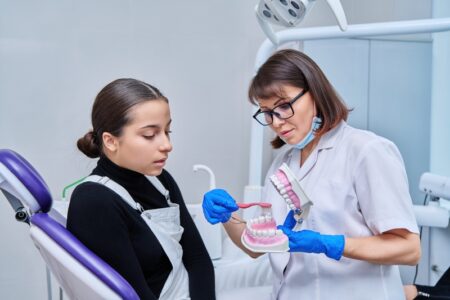Dental cleanings can become lifelines to children struggling with mental health
As a parent, and a former teacher, I wholeheartedly believe that it does indeed take a village to raise our children, particularly as they face mental health challenges throughout their lives. It’s with that in mind that I have found how important dental health is to our children’s mental health.
While the relationship may not be immediately obvious, research shows that our mouths and our children’s mouths are indicators of both physical and mental health. For example, anxiety can cause teeth grinding, clenching, and cracking, while depression can leave signs of oral neglect. Certain eating disorders speed up decay of the mouth and substance use leaves many warning signs.
Our children’s mouths are a wealth of information. With proper investment in training, dentists can have the expertise to catch warning signs and have the tools and understanding to not only screen patients, but to make connections for families who are in need of support.
It’s easy to take those moments for granted, but it’s those moments where your community becomes your village. No matter how much time you spend with your kids, you can’t and won’t see or catch everything. That’s why it’s so important to incorporate mental health screenings across health care settings, schools and extracurriculars, and in this case in dental health, to increase visibility into our children’s mental wellbeing and increase access to care for families across the country. There are no places unfit to expand access to mental health care.
Tooth decay is the most chronic disease for children ages 6 to 19, meaning twice a year cleanings and appointments in between become opportunities to catch warning signs for mental health challenges your child might be facing. And the problem can be twofold, when a child’s oral health is suffering, it can exacerbate their mental health issues. At the same time, mental health can affect the state of one’s teeth and gums. When a child has poor mental health, they might eat or drink too many sugary foods or beverages. Or, they might be battling low energy that affects their upkeep of their hygiene, such as brushing their teeth at night.
When we equip our dental care professionals with the tools, resources and payments to screen for depression, anxiety, and other mental health concerns at dental visits, we will see an increase in referrals for mental health and substance use treatment. We can do this by not only resourcing the training necessary for dentists but by ensuring they are in turn reimbursed for additional screenings. We have already seen this in practice – a 2016-17 project with the Indian Health Service and Tribal dental programs successfully conducted depression screenings in dental settings, leading to an increase in dental referrals to mental health and substance use treatment by nearly 400%.
It’s statistics like this that can and should serve as a catalyst in informing policy, such as embedding dental health care in behavioral health clinics and training staff in mental health and substance use disorder education, as recommended by a National Council for Mental Wellbeing report. While the National Council and American Dental Association have put forth recommendations for increasing coordination of care, most interventions and pilots in Medicaid have focused exclusively on adults. However, children and youth can also stand to benefit greatly from increased access to care. At present, mental health and dental care are both covered by the Early and Periodic Screening, Diagnostic, and Treatment (EPSDT) mandates, which the Center for Medicare & Medicaid Services (CMS) just reaffirmed.
We have an opportunity and an obligation to increase care and coordination across many health care systems, particularly as oral health plays such a big role in our kid’s lives. From provider and patient education, screening and referrals, to offering service interventions or embedding mental care providers, with this in mind, we can continue to fight for a robust health care system that better links mental and dental health through screenings, training, and coordinated whole-person care that makes for healthy adults and children. When we are thinking about our youth especially, “no wrong doors” means all the doors they go to on a regular basis: community clinics, schools, pediatrician offices, and dental offices. And when we talk about the village that helps raise our children, it includes our doctors, teachers, family members, and even our dentists.

